- Home
- Penelope Lively
The Road to Lichfield
The Road to Lichfield Read online
PENELOPE LIVELY
The Road to Lichfield
Penguin Books
Contents
One
Two
Three
Four
Five
Six
Seven
Eight
Nine
Ten
Eleven
Twelve
Thirteen
Fourteen
PENGUIN BOOKS
THE ROAD TO LICHFIELD
Penelope Lively grew up in Egypt but settled in England after the war and took a degree in history at St Anne’s College, Oxford. She is a Fellow of the Royal Society of Literature and a member of PEN and the Society of Authors. She is married to Professor Jack Lively, has a daughter, a son and four grandchildren, and lives in Oxfordshire and London.
Penelope Lively is the author of many prize-winning novels and short-story collections for both adults and children. She has twice been shortlisted for the Booker Prize; once in 1977 for her first novel, The Road to Lichfield, and again in 1984 for According to Mark. She later won the Booker Prize for her highly acclaimed novel Moon Tiger in 1987. Her other novels include Passing On, shortlisted for the 1989 Sunday Express Book of the Year Award, City of the Mind, Cleopatra’s Sister and Heat Wave. Many of her books, including Going Back, which first appeared as a children’s book, and Oleander, Jacaranda, an autobiographical memoir of her childhood days in Egypt, are published by Penguin.
Penelope Lively has also written radio and television scripts and has acted as presenter for a BBC Radio 4 programme on children’s literature. She is a popular writer for children and has won both the Carnegie Medal and the Whitbread Award.
TITLES BY PENELOPE LIVELY IN PENGUIN
FICTION
Going Back
The Road to Lichfield
Treasures of Time
Judgement Day
Next to Nature, Art
Perfect Happiness
Corruption and Other Stories
According to Mark
Pack of Cards: Stories 1978-1986
Moon Tiger
Passing On
City of the Mind
Cleopatra’s Sister
Heat Wave
Beyond the Blue Mountains
Spiderweb
The Photograph
Making It Up
Consequences
Family Album
How It All Began
NON-FICTION
The Presence of the Past: An Introduction to Landscape History
Oleander Jacaranda: A Childhood Perceived
A House Unlocked
For JACK
One
Anne Linton drove north to Lichfield through the morning. Berkshire gave way to Oxfordshire, Oxfordshire to Warwickshire, and Warwickshire to Staffordshire. A scum of insects gathered at the edge of the windscreen; the landscape lay misty and unreal at either side of the car, the road slicing through fields and villages as though it were of a different dimension, a different order of things. From time to time towns offered themselves on signposts – Daventry 12, Stratford 8, Birmingham 17. They seemed like actors in the wings, and the landscape itself a palimpsest, suggesting another time, another place. Edgehill recalled the Civil War; Tam worth, lurking over to the right, had something Saxon about it, she seemed to remember. Her own past, too, waved a cheery hand from over the horizon, or the other side of a motorway interchange. In Stratford, once, on a wedding anniversary outing to a production of Much Ado she and Don had discussed on the banks of the Avon whether or not to conceive another child. And in Oxford – well, in Oxford of course a great deal more than that had happened. She had thought of that last night, planning her journey. Private and public memory, it seemed, were fused on the R.A.C. Route Guide.
‘I could go through Oxford.’
‘Trafficwise,’ her husband had said, ‘You would do better not to.’
And so her intended route had lain neatly to the left, obedient to bypasses and ring-roads, and so also, when the city had appeared, shining in the sun like a mirage, she had obeyed instead some whim, and swung off in pursuit of the City Centre signs. And had sat then trapped in a traffic jam somewhere down by the station, remembering Don’s advice and wondering why this place did not inspire more feeling. She had fallen in love here, taken irrevocable decisions here, but it seemed in no way personal. Living a bare twenty miles away, they seldom visited it, were never inclined to home on it for reunions or brandish it before their children like a possession. She thought of stopping for a cup of coffee, vacillated in confusion before an unfamiliar system of one-way streets, and picked her way up through the town towards Leckford Road. Let us see, she thought, what this will do.
And, turning into it, there came indeed the obedient ghost of an emotion, the relic of joy as that particular window came into view. At this point, by this particular lamp-post, once upon a time, she would walk more slowly, prolonging the approach, because however glorious the seeing him, the being-about-to-see-him had to be savoured to the full, drawn out step by step along this enchanted street of sour brick and shabby privet hedges. At that corner, time was, she could expect to see his duffle-coated figure coming towards her, wheeling a bicycle whose loose spoke clicked with each turn of the wheel, the background music of happiness. Which window? she thought, muddled – that one? Or that? A curtain was pulled back, and she found herself staring for a moment into the eyes of a strange young man. Behind her, someone hooted impatiently (no parking spaces in this road, cars glittering bumper to bumper along the kerb, how right Don was, what have they done to this place?) and ahead lay a long road yet to Lichfield, and the time already nearly twelve. She put her foot on the accelerator. No more of this, whatever it may have been.
And now, an hour later, stopped again, but more advisedly this time, to fill up with petrol, she checked the route. She had begun there, at that dot, and now was here, at this: a mere hand-span on the map. From Cuxing to Lichfield, a hundred odd miles, measured perfunctorily in finger-lengths last night, at the kitchen table.
‘At a conservative estimate, I should think you’re about twenty miles out, with that method. Here, let me.’
And of course there is a gadget with which such reckonings are made, a little thing that runs on a wheel along the map and comes up with what you want. ‘And here,’ he says, ‘I’ll do a route out for you, give me a bit of paper, pass the map over.’ And presently there it all is, planned out leg by leg with the distance roundly stated at the end.
‘Thank you, darling.’
But, somehow, she left it behind, the bit of paper, along with the other bit of paper she had parked on the kitchen table issuing instructions about meals (supper tonight in fridge, buns for tea in bin) and reminders (dinner money on shelf, ‘phone me tonight). By the day after tomorrow it would be lost or forgotten and in any case few men, not even prudent and organized men like Don, are going to reproach a wife returning from a visit to her dying father for not going the way she had been told to go.
Lichfield, of course, is the ultimate fusion of private and public memory. Lichfield belongs once and for all to Samuel Johnson, and is also where my father has lived – or just outside which my father has lived – for the last twenty years. Samuel Johnson, she thought, paying the garage attendant without seeing him or hearing what he said, so that only his finger tapping the closed window recalled her sufficiently to take the proffered change, Samuel Johnson once said a formal farewell to a dying old woman. He sat beside her bed and prayed with her and said goodbye for ever. Nowadays we do not do that. I haven’t, she thought, the slightest idea what I am going to say to father, or even what, if anything, he will be able to say to me. Confused, this Matron p
erson had said, confused and going downhill rapidly, I’m afraid. And Anne had wanted to say: but it is I who am confused, who are you and what are you doing with my father?
She had said to Don, later ‘It’s just like him. Just like him to be getting ill and not tell anyone and then up and dump himself in some nursing-home, with everything arranged and sorted out. It’s only three months since we were there. He seemed perfectly all right then.’
‘He’s eighty, remember.’
‘I know that.’
‘You sound as though he’s done you an injury. He was trying to save you trouble, presumably, and preserve his own independence.’
Oh, do be quiet, she thought, you don’t understand at all, and when he ploughed on with, ‘Hadn’t you better get hold of Graham?’ she had snapped, ‘Look, do leave that to me,’ and the disagreement might have blossomed and run its proper course except that reasonable people do not quarrel at such a time. Or, indeed, much at all.
She was, now, on the outskirts of Lichfield and must devote herself to finding this place which she did not know in some unfamiliar suburb. When had her father tracked it down? In what cool moment had he said yes, that will do, I will take myself there? Perhaps, she thought, running it to earth at last, solid and sombre and nineteenth century amid its institutional garden and gravelled drives, perhaps it made him think of schools. It might have been one once. He must have inspected many such places, approving or disapproving of dubious private establishments on behalf of the Ministry.
But no, getting closer, leaving her car beyond the notice that tidily segregated Visitors from Staff, passing through an open door into a black and white tiled entrance hall, she could see the place had had a more domestic past. This must originally have been the home of some prosperous Victorian. The marble frieze above the fireplace was surely a legacy of someone’s personal taste (albeit most discreetly of its time); the stained glass fanlight above the door displayed a proper civic pride, with the cathedral crudely rendered in green and red. Some local manufacturer on the way up, presumably.
‘Will you come this way, Mrs Linton.’
The nurse tapped ahead down linoed corridors, talking cheerfully of weather and distances.
‘How is he?’
‘Very up and down, you know. Rather confused. But he knows you’re coming. He’s expecting you.’
Her father, propped high on pillows that seemed to devour him, their plumpness engulfing his thin face and body, turned his head as they came in, peering.
‘Who is it?’
‘It’s me, father.’ She bent to kiss him and he said doubtfully, ‘Anne?’
‘Yes. Anne.’ How could illness make a person appear literally to have shrunk? His eyes were filmy – how much could he see?
The nurse said, ‘I’ll leave you with him, Mrs Linton. They’ll be bringing him his lunch soon. Would you like something yourself?’
‘I’d love a cup of coffee.’
‘I’ll tell them.’
Anne pulled a chair up beside the bed. Now sound normal and ordinary, the last thing he wants (or ever wanted) is fuss, a performance (distantly, in her childhood, a crisp voice saying, ‘That’ll do, Anne, we’re not having a performance …’).
‘Everybody sends their love’ – yes, her voice was coming out loud and overbright – ‘Don was sorry he couldn’t get away just now but it’s a bit of a bad time at the office. Paul’s got O-levels coming up, you know, this year, so he’s actually doing a bit of work I’m glad to say. Judy’s having riding lessons, I didn’t want her getting involved in all that kind of thing but it’s hopeless, living where we do ….’
And he was not, she could see, taking in a word. He smiled and blinked with the half-comprehension of the deaf (yes, he was a lot deafer last time we were up, that I did notice) . Start again, more slowly, more clearly; what could be more tiresome when you are old and ill than someone, albeit someone you love, yapping at you things that you cannot understand. And yes, that’s better, now he’s remembered who Judy is, now we’re getting somewhere.
The old man’s speech was laboured, backed with a dry whistling of his breath. She, too, strained to follow. ‘How long do I what? Stay? Oh, I’m staying a couple of days this time, and then I’ll be up again soon.’
A nurse brought a tray and set it on the bedside table. ‘There, dear. Are you going to sit up a bit more?’ She said to Anne, ‘He manages fairly well on his own, but he may need a hand when it comes to the tea.’
The food was pappy stuff in bowls. The old man ate slowly, each spoonful a new difficulty; he was absorbed in what he was doing. When his hand shook uncontrollably and food dribbled down his chin Anne found herself reaching forward to take the spoon from him and retrieve the mess with the familiar deft movement she had used in feeding her own young children. Her father appeared quite unaware of her. She sat drinking her own coffee. Her ears buzzed still with travel motion; she felt both depressed and charged with energy. I must go out to the house and see what needs doing, it must need airing, cleaning perhaps – does that Mrs Ransome still come? – I could bring him flowers from the garden.
‘We thought we’d go to Scotland this year, father, for our holiday. Just Judy and us – Paul has something fixed up with a school party.’
‘Southwold’ the old man said, with sudden clarity.
‘Not Southwold, Scotland.’
‘We took you to Southwold when you were a child, your mother and I.’
‘Southwold in Suffolk? Yes, I remember.’
‘You remember?’ He seemed pleased.
‘You bought me a red spade. And there were sea-birds running in and out of the water at low tide – I can see them now. Little spindly legs skittering about.’
‘That was just after the Great War.’
‘No, no, father,’ she laughed. ‘I wasn’t born then. Don’t make me feel older than I am. It would have been about 1939 – the last war, not the one before.’
‘Eh?’ He stared stupidly at her and said again ‘You remember Southwold?’
There was a knock at the door. ‘May I come in, Mr Stanway?’
The speaker came into the room, saw Anne and hesitated. ‘I’m so sorry. I didn’t realize you already had a visitor. I’ll come back later.’ The old man, peering, said something inaudible: he was trying to smile.
Anne said, ‘No. Please don’t. I shall have to go in a little while anyway.’ They looked from each other, awkwardly, to the old man in the bed, the link who might explain each to the other, but he merely blinked and muttered. Anne said ‘I’m Anne Linton. His daughter.’
‘Oh – yes, of course. I should have realized. My name’s Fielding, David Fielding. I used to be a neighbour of your father’s out at Starbridge, and we’ve kept in touch over the last year or two.’
The old man said suddenly, ‘Mr Fielding runs that school. He’s the headmaster. You know, that school …’ He looked from one to the other of them for help, his voice trailing away.
David Fielding said, ‘The boys’ school. Your father took rather an interest at one time.’
She said, ‘I’m sure. He didn’t like retiring – he never could keep away from schools.’ They both looked towards the bed again, smiling.
Benign smiles, Anne thought, at least mine is. Benign understanding smiles, as to a child. He shouldn’t be talked of like this, as if he weren’t here, or was too stupid to understand. And David Fielding, seeming to share her feelings, pulled up a chair and sat by the bed. He talked to her father, waiting patiently through his laboured responses, and making his own remarks clear and careful. Anne thought: what a nice man, why did father never mention him I wonder, but he always liked to shut off bits of his life, even when mother was alive. She always complained she never knew his friends.
After a while she said, ‘I’ll go now, I think, father, I want to have a word with the Matron. I’ll see you again this evening.’ David Fielding got up, ‘Look, I don’t want to be in the way …’
‘You aren’
t in the least. There’s a lot I must do today. Goodbye – it was nice meeting you.’
‘Goodbye.’
Sitting in the Matron’s chintzy office, looking out onto neat lawns swept by a huge Cedar of Lebanon, beneath which old people were tidily disposed on benches and wheelchairs in the early spring sunshine, she said ‘What exactly is wrong with him?’
The Matron smoothed her hand across a card in front of her, hesitated a moment, ‘Parkinson’s, of course, but that can be controlled nowadays – there is this new drug. His heart is weak. Incontinence.’ She looked across the desk at Anne. ‘Old age, in the end. The body running down, you know.’
For a moment Anne thought again of Southwold, revived just now for the first time in many years; she saw that same body, upright in a pewter sea, urging her towards it with outstretched hands. She said, ‘Yes, I suppose so.’ And then, ‘He seems quite comfortable.’
‘He is quite comfortable. We can see to that. But he will go downhill from now on, I’m afraid.’ The Matron paused and went on, delicately. ‘I think that if you feel – if you wanted to make arrangements about his house, that kind of thing, it might be wise.’
‘He can’t ever go back there? Even – even with nursing arrangements or something? If he improved?’
‘He won’t, I’m very much afraid, ever improve that much.’ Anne said ‘I suppose he knew that?’
‘One rather had that impression. He was more lucid – much more – when he first came to us.’
There was the faintest creak from the Matron’s chair; a minute shift of stance indicating perhaps the passage of time, other patients, other matters to be seen to …. Anne said, ‘Yes, I see. I thought in fact I’d use the house myself while I’m coming up to see him.’ She got up. ‘You will let me know how he is?’
The Matron smoothed her notes again. She said, ‘Of course. We must think in terms of months, or possibly weeks. It’s very unpredictable, though. He might rally – but I would be surprised. Your visits will be the greatest help. Some of my old people have no visitors – no telephone calls; that I find very sad.’ She smiled with sudden sweetness and Anne thought: she is a nice person, kind, good. Or am I in such a state of susceptibility that everyone I meet seems nice?

 The House in Norham Gardens
The House in Norham Gardens Family Album
Family Album Life in the Garden
Life in the Garden Oleander, Jacaranda: A Childhood Perceived
Oleander, Jacaranda: A Childhood Perceived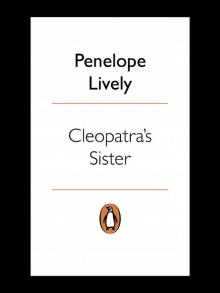 Cleopatra's Sister
Cleopatra's Sister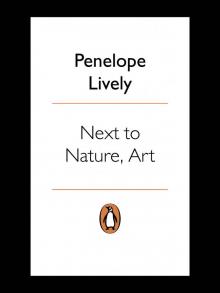 Next to Nature, Art
Next to Nature, Art A Stitch in Time
A Stitch in Time Moon Tiger
Moon Tiger The Photograph
The Photograph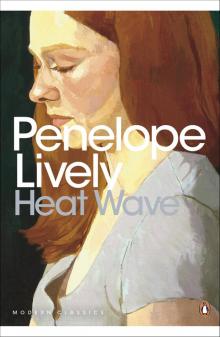 Heat Wave
Heat Wave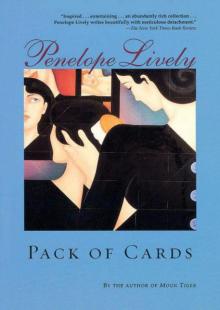 Pack of Cards
Pack of Cards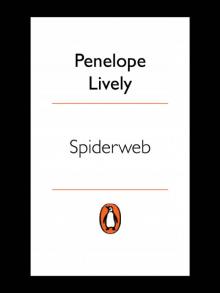 Spiderweb
Spiderweb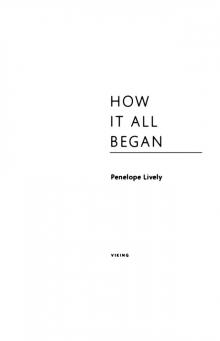 How It All Began
How It All Began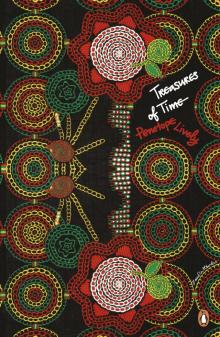 Treasures of Time
Treasures of Time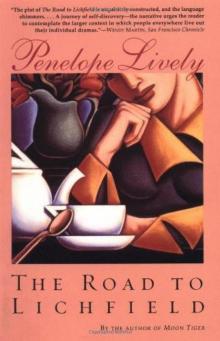 The Road to Lichfield
The Road to Lichfield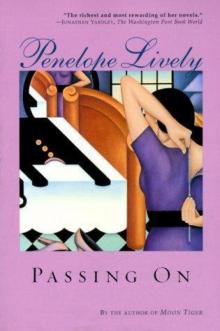 Passing On
Passing On Making It Up
Making It Up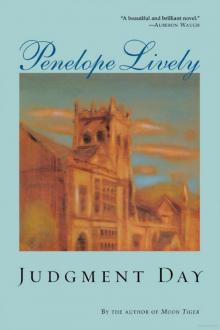 Judgment Day
Judgment Day The Purple Swamp Hen and Other Stories
The Purple Swamp Hen and Other Stories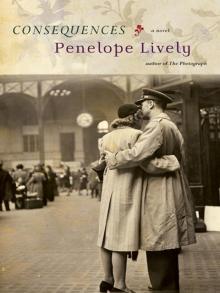 Consequences
Consequences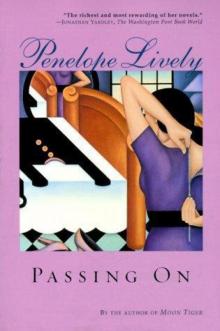 *****Passing On*****
*****Passing On*****